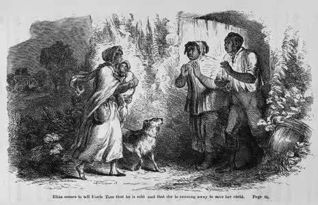Understanding the Uncle Tom Meaning: A Comprehensive Overview
Have you ever come across the term “Uncle Tom” and wondered what it means? This term, which has its roots in American history, has evolved over time to carry various connotations. In this article, we will delve into the origins, meanings, and implications of the Uncle Tom meaning, exploring its multifaceted nature from different perspectives.
Origins of the Term

The term “Uncle Tom” originated from Harriet Beecher Stowe’s 1852 novel, “Uncle Tom’s Cabin.” The character Uncle Tom, portrayed as a loyal, Christian slave, became a symbol of the oppressive system of slavery. Over time, the term has taken on a broader meaning, encompassing various aspects of behavior and character.
Historical Context

During the 19th century, the term “Uncle Tom” was used to describe a compliant and loyal slave. This portrayal was often used to perpetuate the myth of the contented slave, who was grateful for his or her master’s kindness. However, this depiction was far from accurate, as the reality of slavery was one of exploitation and cruelty.
Modern Interpretations

In modern times, the term “Uncle Tom” has taken on a more negative connotation. It is often used to describe someone who is excessively accommodating, subservient, and self-denying, especially in the context of race relations. This usage is often seen as a derogatory term, suggesting that the person is willing to sacrifice their own dignity and rights for the sake of others.
Psychological Aspects
From a psychological perspective, the Uncle Tom meaning can be linked to the concept of internalized racism. This refers to the process by which individuals, particularly people of color, adopt the attitudes and beliefs of the dominant culture, often at the expense of their own self-worth and dignity. The term “Uncle Tom” can be seen as a manifestation of internalized racism, where an individual is willing to conform to the expectations of the dominant group, even if it means compromising their own values.
Societal Implications
The Uncle Tom meaning has significant societal implications, particularly in the context of race relations. The term is often used to criticize individuals who are perceived as too accommodating or compliant, suggesting that they are not standing up for their rights or the rights of others. This can lead to a perpetuation of stereotypes and a reinforcement of power imbalances.
Table: Variations of the Uncle Tom Meaning
| Context | Meaning |
|---|---|
| Historical | Compliant and loyal slave |
| Modern | Excessively accommodating and subservient |
| Psychological | Manifestation of internalized racism |
| Societal | Individuals who are too accommodating or compliant |
Challenges and Criticisms
Despite its widespread use, the term “Uncle Tom” has faced criticism for its derogatory nature and potential to perpetuate stereotypes. Some argue that the term is too broad and can be applied to a wide range of behaviors, making it difficult to pinpoint a specific meaning. Others suggest that the term is harmful and should be avoided in favor of more inclusive and respectful language.
Conclusion
Understanding the Uncle Tom meaning requires examining its origins, historical context, modern interpretations, psychological aspects, and societal implications. While the term has evolved over time, it remains a complex and multifaceted concept that continues to spark debate and discussion. By exploring these different perspectives, we can gain a deeper understanding of the term and its impact on society.



